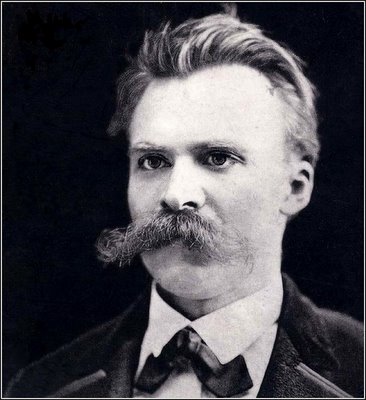


Christianity as an institution and Jesus
In Nietzsche's book the Anti-Christ, Nietzsche fights against how Christianity has become an ideology set forth by institutions like churches, instead of representing the life of Jesus. It is important, for Nietzsche, to distinguish between the religion of Christianity and the person of Jesus.
Nietzsche attacked Christian religion as it was represented by churches and institutions for what he called its "transvaluation" of healthy instinctive values. He went beyond agnostic and atheistic thinkers of the Enlightenment, who felt that Christianity was simply untrue. He claimed that it may have been deliberately propagated as a subversive religion (a "psychological warfare weapon" or what some would call a "memetic virus") within the Roman Empire by the Apostle Paul as a form of covert revenge for the Roman destruction of Jerusalem and the Temple during the Jewish War.
Nietzsche contrasts the Christians with Jesus, whom he greatly admires. Nietzsche argues that Jesus transcended the moral influences of his time by creating his own set of values. As such Jesus represents a step towards the overman. Ultimately, however, Nietzsche claims that, unlike the overman, who embraces life, Jesus denied reality in favor of his "kingdom of God," and that Jesus' refusal to defend himself, and subsequent death, were logical consequences of this total disengagement.
Nietzsche then analyzes the history of Christianity, finding it to be a progressively grosser distortion of the teachings of Jesus. He criticizes the early Christians for turning Jesus into a martyr and Jesus' life into a story of the redemption of mankind in order to gain power over the masses, finding them to be cowardly, vulgar, and resentful.
He argues that Christianity had become more and more corrupted, as successive generations further misunderstood the life of Jesus. By the 19th century, Nietzsche concludes, Christianity had become so worldly as to be a parody of itself--a total inversion of a world view which was, in the beginning, nihilistic.
[edit]
http://en.wikipedia.org/wiki/Friedrich_Nietzche#Nihilism_and_the_death_of_God
The parties which exist at present and which draw their profits from the State as it now is cannot be expected to bring about a radical change in the regime or to change their attitude on their own initiative.
This is rendered all the more impossible because the forces which now have the direction of affairs in their hands are Jews here and Jews there and Jews everywhere.
The trend of development which we are now experiencing would, if allowed to go on unhampered, lead to the realization of the Pan-Jewish prophecy that the Jews will one day devour the other nations and become lords of the earth.
In contrast to the millions of 'bourgeois' and 'proletarian' Germans, who are stumbling to their ruin, mostly through timidity, indolence and stupidity, the Jew pursues his way persistently and keeps his eye always fixed on his future goal.
Any party that is led by him can fight for no other interests than his, and his interests certainly have nothing in common with those of the Aryan nations. If we would transform our ideal picture of the People's State into a reality we shall have to keep independent of the forces that now control public life and seek for new forces that will be ready and capable of taking up the fight for such an ideal.
For a fight it will have to be, since the first objective will not be to build up the idea of the People's State but rather to wipe out the Jewish State which is now in existence. As so often happens in the course of history, the main difficulty is not to establish a new order of things but to clear the ground for its establishment.
Prejudices and egotistic interests join together in forming a common front against the new idea and in trying by every means to prevent its triumph, because it is disagreeable to them or threatens their existence. That is why the protagonist of the new idea is unfortunately, in spite of his desire for constructive work, compelled to wage a destructive battle first, in order to abolish the existing state of affairs.
A doctrine whose principles are radically new and of essential importance must adopt the sharp probe of criticism as its weapon, though this may show itself disagreeable to the individual followers. It is evidence of a very superficial insight into historical developments if the so-called folkists emphasize again and again that they will adopt the use of negative criticism under no circumstances but will engage only in constructive work. That is nothing but puerile chatter and is typical of the whole lot of folkists.
It is another proof that the history of our own times has made no impression on these minds. Marxism too has had its aims to pursue and it also recognizes constructive work, though by this it understands only the establishment of despotic rule in the hands of international Jewish finance. Nevertheless for seventy years its principal work still remains in the field of criticism. And what disruptive and destructive criticism it has been!
Criticism repeated again and again, until the corrosive acid ate into the old State so thoroughly that it finally crumbled to pieces. Only then did the so-called 'constructive' critical work of Marxism begin. And that was natural, right and logical.
An existing order of things is not abolished by merely proclaiming and insisting on a new one. It must not be hoped that those who are the partisans of the existing order and have their interests bound up with it will be converted and won over to the new movement simply by being shown that something new is necessary.
On the contrary, what may easily happen is that two different situations will exist side by side and that the-called philosophy is transformed into a party, above which level it will not be able to raise itself afterwards. For the philosophy is intolerant and cannot permit another to exist side by side with it. It imperiously demands its own recognition as unique and exclusive and a complete transformation in accordance with its views throughout all the branches of public life. It can never allow the previous state of affairs to continue in existence by its side.
http://www.hitler.org/writings/Mein_Kampf/
Heinrich Himmler
http://en.wikipedia.org/wiki/Heinrich_Himmler



























No comments:
Post a Comment